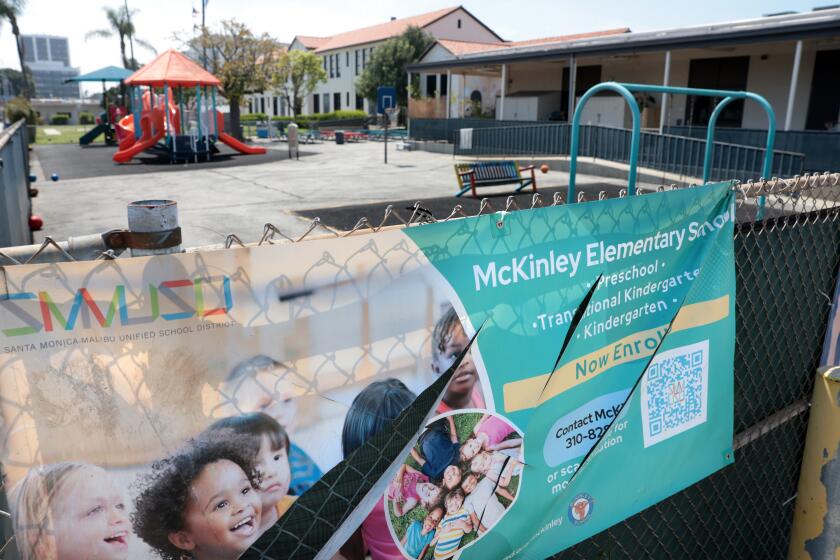Trial May Hinge on Alleged Rape Victim’s Actions
The UCLA student testified that after first resisting, she had been silent as she was gang-raped in her dormitory room on campus two years ago.
After the attack, the freshman said, she finished a paper, attended a class and stopped by the student health center for a “morning after” pill. She did not report the attack for three hours, according to court documents.
Her actions after the alleged attack by three high school students who were visiting the campus could be the key to whether a jury sees the case as a crime or, as the defense contends, consensual sex.
Rape trauma syndrome -- the physical, behavioral and psychological damage suffered by most sexual assault victims -- is emerging as a central issue in the trial of the three defendants. It can appear as increased fear and anxiety; self-blame and guilt; feelings of helplessness, humiliation and shame; disorientation; and an intense need to move beyond the assault.
The three defendants -- Deshawn Carter Stringer, Jamar Dawson and Chuwan Anthony, all now 18 -- are charged with rape. Stringer also has been charged with groping another student on the same day. If convicted, Stringer faces up to 34 years in prison and Dawson and Anthony up to 42 years.
Prosecutors have alleged that the three entered the room of the student identified in court documents as Jane Doe and raped her.
“Most people ... don’t know a lot about common reactions of rape victims before, during and after assault,” said Deputy Dist. Atty. Alyson Messenger, the prosecutor in the case.
Messenger said she would call an expert to testify about the reactions of sexual assault victims, testimony that she called “critical” in helping the jury understand the victim’s behavior.
But defense attorneys will urge jurors to conclude that the same evidence demonstrates that the sex, which occurred when the three defendants were on a field trip to UCLA from Carson High School, was consensual.
“It’s a consent or no consent case,” said Earl Broady Jr., an attorney for Stringer.
“The question is whether or not a complaining witness has a valid claim of force or threat of force.... Her conduct, her body language and her reporting is consistent with our defense.”
The incident occurred on Dec. 5, 2002. Stringer, Dawson and Anthony were visiting UCLA to see university life and learn more about the institution’s transfer program.
After a brief orientation, they were allowed to explore the campus on their own, in accord with the trip’s guidelines. The trio, members of their school’s football team, entered several dorms at De Neve Plaza by following residents who had unlocked the doors with key cards.
Once inside, they gained entrance to at least three rooms, posing as transfer football players. About 11:30 a.m. they knocked on Jane Doe’s door. She said she had not invited Stringer into her room, but had not resisted his entry. Stringer raped her, she testified at his preliminary hearing last year.
After Stringer left, Anthony and Dawson entered and raped and sexually assaulted her, she testified.
She testified that she had said “no” repeatedly to Stringer, but had not resisted further. She testified that she thought that “if I just did whatever they wanted me to do, they would just go ahead and leave me alone.”
Her post-assault behavior seemed consistent with that of a victim who was in shock but continued with her routine because she did not know what to do, said Kimberly Wong, a clinical social worker and director of counseling services for the Los Angeles Commission on Assaults Against Women, a nonprofit organization that seeks to eliminate violence against women.
“There is no one way to respond to a sexual assault,” Wong said. “It is not unusual for a rape survivor to not fight back, or to fight back, or to not say anything because of fear or because of wanting it to be over.”
Marybeth Carter, executive director of the California Coalition Against Sexual Assault, a statewide organization that promotes public policy, advocacy and training about sexual assaults, said the trial needed to focus on the defendants.
“The issue is not how much trauma was created but whether an illegal act occurred,” Carter said. “The focus here needs to be on the person that committed the act as opposed to how the person who experienced the act reacted.”
Although Stringer and Anthony were 17 and Dawson 16 at the time of the incident, they are being tried as adults. Each is free on bail.
“[For the defense to win] the jury has to believe a young woman
There have been two rapes by strangers in UCLA residence halls since 1933, according to the university.
More to Read
Start your day right
Sign up for Essential California for news, features and recommendations from the L.A. Times and beyond in your inbox six days a week.
You may occasionally receive promotional content from the Los Angeles Times.






